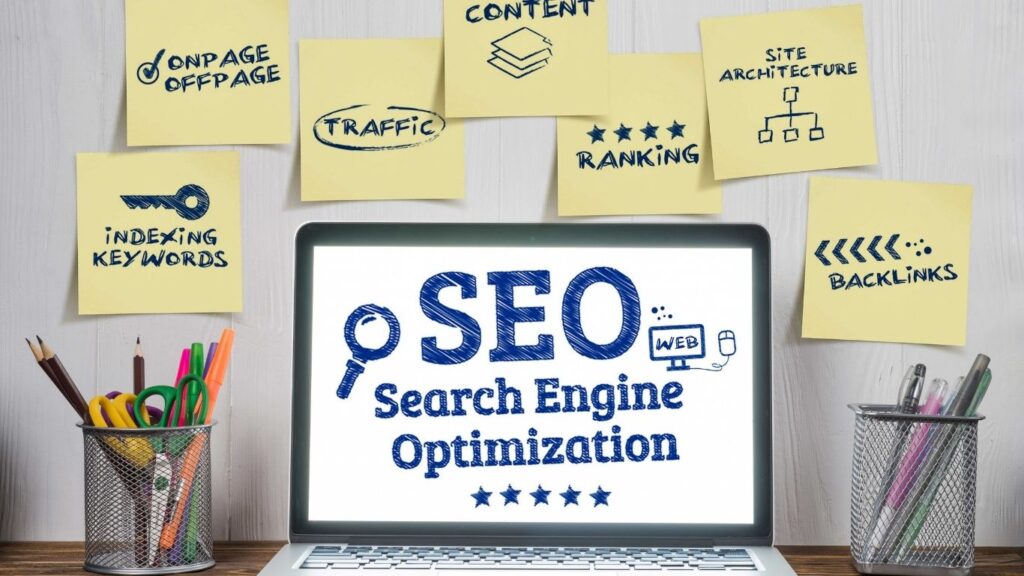In this digital age, as more businesses and creators go online the importance of SEO (Search Engine Optimization) continues to grow. This is very important for increasing website visibility, drawing traffic to the website, and also achieving growth and success in the digital world.
What is Search Engine Optimization (SEO)?

In simple words, SEO is the practice of optimizing your website and its content to make it more visible on search engines like Google. The goal is to rank higher in search engine results pages (SERPs) so that when people search for relevant keywords they find your website at the top.
SEO involves several components:
- Keyword Research: Identifying searched terms that the audience is looking for.
- On-Page Optimization: Using these keywords naturally in the content, titles, and meta description.
- Technical SEO: Improving site speed, mobile responsiveness, and URL structure.
- Link Building: Earning backlinks from reputable websites.
- Content Quality: Creating valuable and original content that engages readers.
This is all about aligning Your website with the way that people search online, making it easier for them to find you when they need your products, services, or information.
Why Search Engine Optimization (SEO) Matters for Your Website?
1. Increased Visibility and Traffic
Ranking on the first page of search engine results is very important for a website’s visibility. Studies show that most people never scroll to the next pages of search engines. So, if your website doesn’t appear on the first page, you are missing out on large numbers of potential visitors.
It helps to optimize your website for relevant keywords so that your website appears in search results when someone looks for products, services, or topics related to your business. As ranking improves, you will naturally attract more organic traffic to your website which can lead to more sales, readers, and brand awareness.
2. High-Quality, Targeted Traffic
SEO attracts people who are interested in what you have to offer resulting in high-quality targeted traffic. Unlike traditional advertising which tries to reach as many people as possible, search engine optimization focuses on attracting people who are already looking for what you offer. This audience is more likely to engage with your content, spend time on the website, and convert into paying customers.
3. Builds Credibility and Trust

Websites that appear at the top of the search results gain more trust and reliability from people. Search engines use complex algorithms to determine trustworthiness and value to users. When your website ranks higher, it signals that you are a reputable source of information and that helps to build trust with potential customers.
Additionally, link building is an important part of this. It involves getting backlinks from trustworthy websites. The more quality backlinks you earn, the more trust your website gains in search engines and in the eyes of users.
Search Engine Optimization (SEO) as a Cost-Effective Marketing Strategy
4. A Long-Term, Cost-Effective Investment
SEO is more cost-effective than other forms of digital marketing. Especially pay-per-click (PPC) advertising. With PPC, you pay for every click, and traffic stops the moment you turn off the ads. On the other hand, SEO builds sustainable traffic over time. It takes effort and patience to rank. Once you rank, you can get benefits without continuous spending.
For small businesses and startups, This is an affordable way to compete with large brands. Smaller companies can also build visibility without the high cost by focusing on niche keywords or local SEO.
5. Search Engine Optimization (SEO) Complements Other Marketing Channels
SEO also supports other digital marketing efforts. Creating a multi-channel approach that drives results across platforms.
Social media: High-quality content optimized for search engines can be shared on a social media platform that drives additional traffic to the website.
Email marketing: Including SEO-based blog posts in a newsletter helps to increase website engagement.
Content Marketing: SEO gives direction to your content marketing strategy. It helps to create blog posts, videos, and also infographics around keywords your audience is searching for.
Working together with other marketing channels, it provides a holistic approach to building a strong online presence
6. Enhanced User Experience (UX)

Google and other search engines prioritize those websites that offer a positive user experience. This includes factors like loading times, mobile-friendly design, and also easy navigation. By implementing technical SEO best practices, you can improve the overall UX of the website. Making it more accessible to users.
Websites with better UX are likely to have lower bounce rates, longer dwell times and higher conversion rates. Improved UX boosts SEO rankings and also makes visitors more likely to engage with the content.
7. Mobile Optimization and Local SEO
With the growth of mobile internet usage mobile optimization is a critical part of SEO. Google uses mobile-first indexing. It prioritizes the mobile version of websites when determining rankings of websites. A website that is optimized for mobile ranks better and provides a smooth experience to users.
For businesses that target a specific area local SEO helps that business show up when people search for near me.
Why Search Engine Optimization (SEO) Matters for Content Strategy?
8. Guides Content Creation
SEO is not only a technical practice. It also shapes the content. Additionally, understanding the keywords that the audience uses you can create a blog post, articles, and other types of content that address specific needs and questions.
Creating keyword-focused content is more likely to attract suitable traffic. This is a roadmap for content strategy, guiding to create material that resonates with the audience.
9. Supports Brand Building

Search Engine Optimization helps to appear consistently in search results. It allows potential customers to see your brand frequently. Similarly, visibility enhances brand recognition as people associate your website with valuable and reliable pieces of information. Consistent SEO work builds brand authority over time helping you stand out from competitors.
Search Engine Optimization (SEO) and Analytics
10. Measurable Results
With the help of tools like Google Analytics and Google Search Console traffic, conversions, keyword rankings, and user behavior can be tracked easily. Likewise, these data provide valuable insights into what is working and what is not allowing SEO strategy as needed.
Conclusion
In this digital age, SEO is no longer optional. It is a must-have to succeed online. SEO matters because it increases website visibility, brings high-quality traffic, builds trust, and supports long-term growth. Investing in SEO means you are creating a path for better engagement and strong brand recognition.
It doesn’t matter whether you are a small business owner, a blogger, or an entrepreneur, SEO can lead to sustained growth and make a more profitable online presence.
